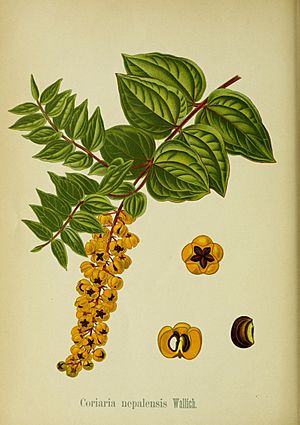Coriaria nepalensis facts for kids
Quick facts for kids Coriaria nepalensis |
|
|---|---|
 |
|
| Scientific classification | |
| Kingdom: | |
| Division: | |
| Class: | |
| Order: | |
| Family: | |
| Genus: | |
| Species: |
C. nepalensis
|
| Binomial name | |
| Coriaria nepalensis |
|
| Synonyms | |
|
C. kweichowensis Hu |
|
Coriaria nepalensis is a type of shrub that grows in the lower parts of the Himalayas mountains. It's known for its bright yellow flowers that appear in spring. Later, in summer, it grows pretty red fruits.
Contents
What it's Called
This plant has many names depending on where you are! In India, people call it things like masuri berry, tanner's tree, or mansur shrub in English. In the Hindi language, it's known as masuri, makola, or masurya. If you're in Nepali, you might hear it called macchaino.
Plant Description
This shrub usually grows to be about 1.5 to 2.5 meters tall. That's like being as tall as a small car!
Flowers and Blooming Time
The flowers of C. nepalensis are yellow and grow in groups. These groups are called inflorescences. Each plant has both male and female flowers. You can see these flowers blooming from February to May.
Fruits and Seeds
The fruits start out red and turn a dark purple color when they are fully grown. They might look like small berries. However, they are actually tiny nuts called achenes. These nuts are covered by the plant's enlarged and colorful petals.
The plant produces its fruits from May to August. It's very important to know that you cannot eat these fruits. Their seeds are poisonous and can be harmful.
Chromosomes
Inside the cells of C. nepalensis, there are 40 chromosomes. Chromosomes are tiny structures that carry all the information about the plant.
Where it Grows
C. nepalensis likes to grow on the southern slopes of the Himalayas. You can find it in countries like Bhutan, India, Nepal, and Pakistan. It usually grows at heights between 800 and 2500 meters above sea level.
This plant also grows in southern China. There, it can be found on mountain slopes from 200 to 3200 meters high. It has been seen in many Chinese provinces. These include Gansu, Guangxi, Guizhou, Henan, Hong Kong, Hubei, Hunan, Jiangsu, Shaanxi, Sichuan, Xizang, and Yunnan.
 | Roy Wilkins |
 | John Lewis |
 | Linda Carol Brown |

